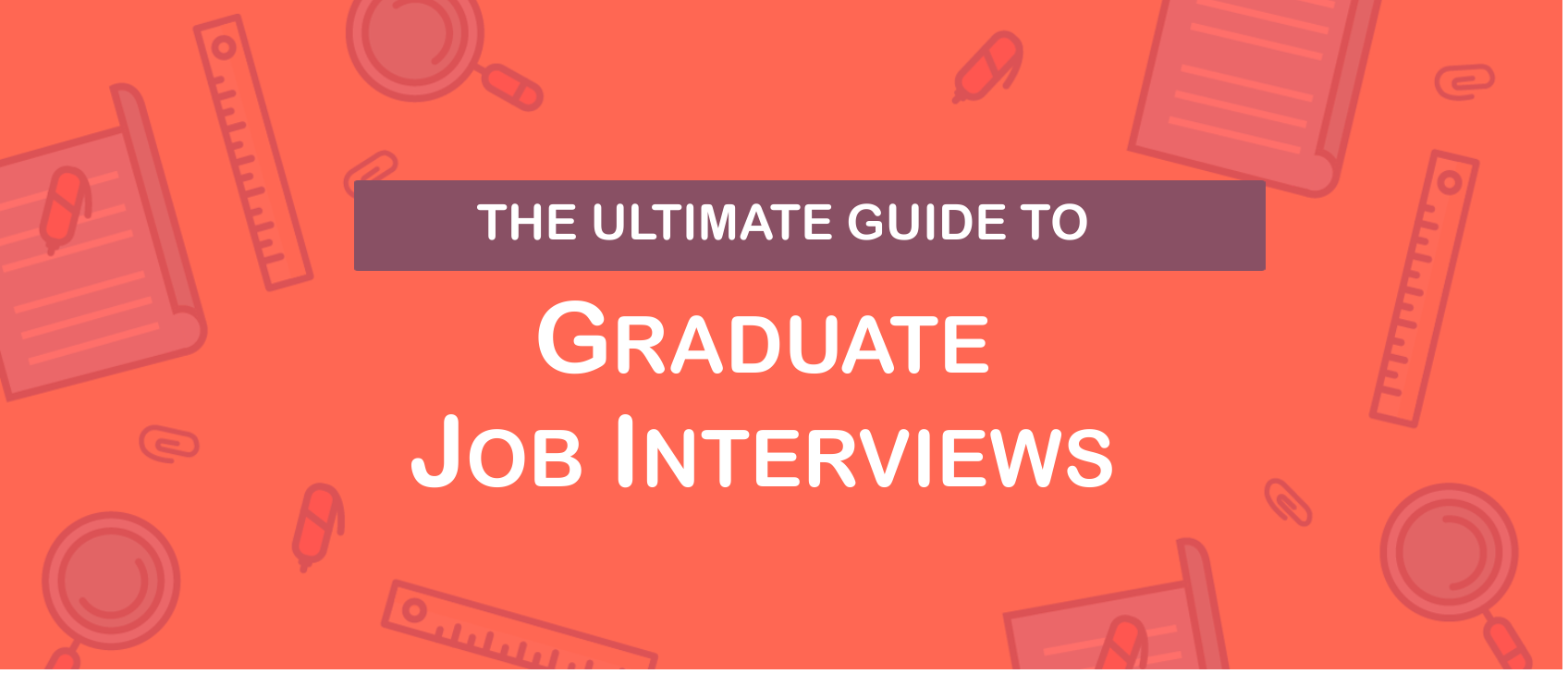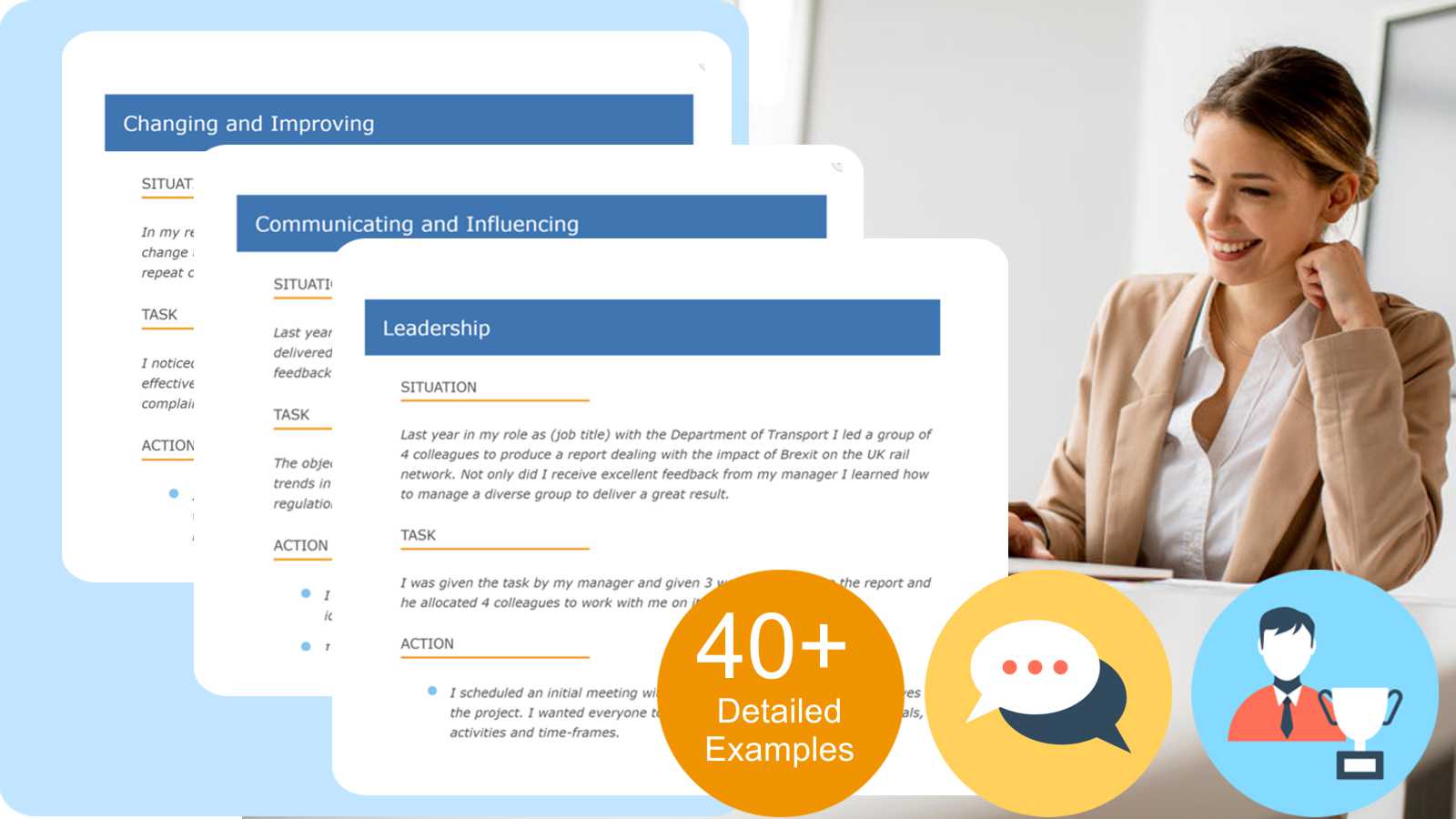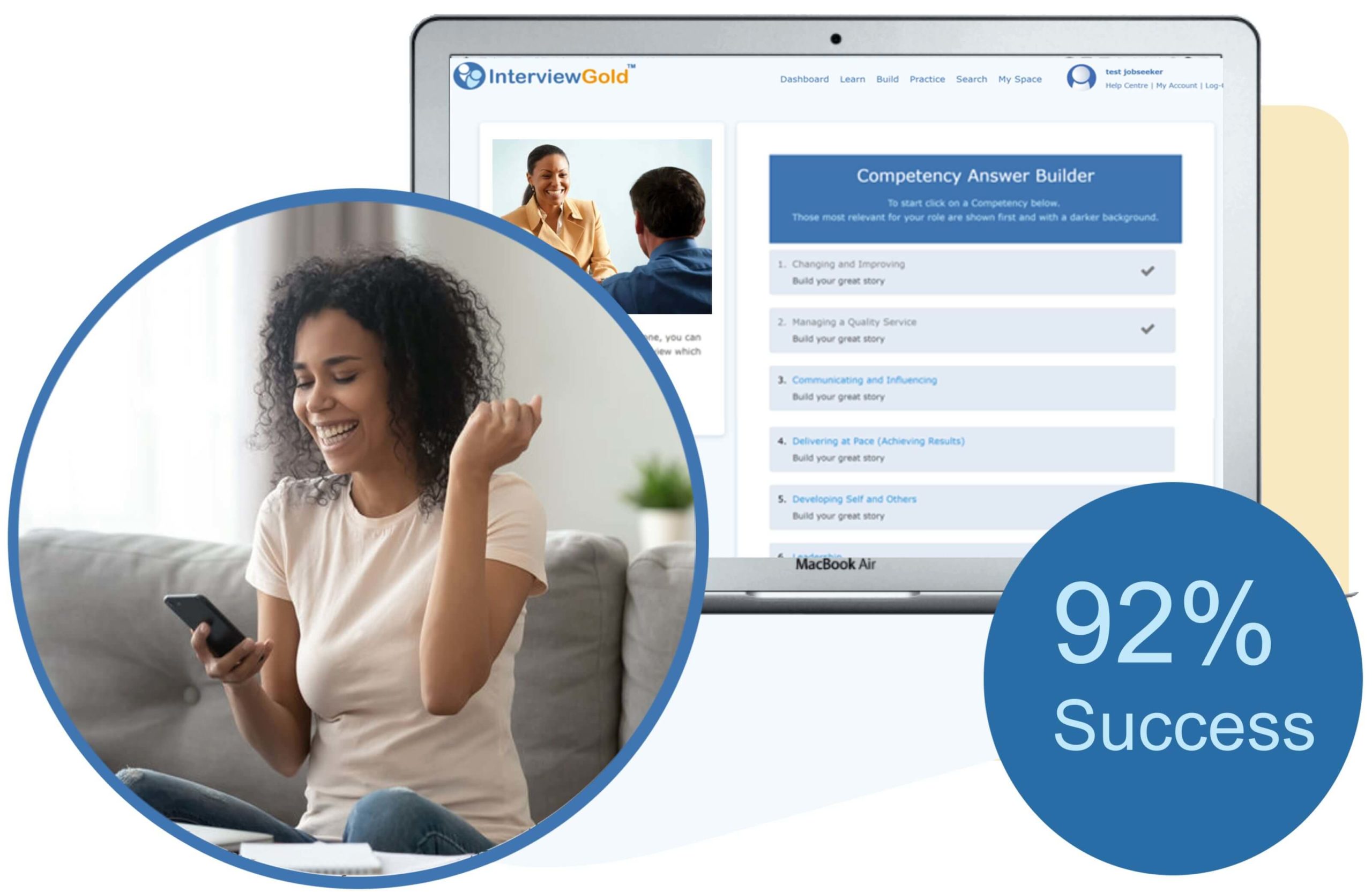
Are you a recent or prospective graduate?
Have a job interview coming up for your first full time role and want to be sure of getting into the post you really want?
As a graduate, you can imagine that facing the world of work can be daunting. This is a major step forward and one that might colour the rest of your career. Choosing the right job with the right employer is vital.
Getting into that job whether it be with a large consulting company such as PWC or bank such as Barclays will be competitive. Getting through the interview process is essential.
This guide to graduate interviews includes questions, answers and top advice helping boost your chances of success.
In This Lesson:
- Why Graduate Job Interviews Are Different
- 3 Key Attributes Employers Look for in Graduate Interviews
- 12 Common Graduate Interview Questions and Answers
- Interview Questions for UK Civil Service Fast Stream
- How to Answer Graduate Interview Questions Brilliantly
- How to Boost Your Success in Your Graduate Job Interview
Why Graduate Job Interviews Are Different

Your first graduate interviews will be different from one which you will experience later in your career.
These mark a crucial juncture as you move into the professional realm, distinct in several aspects from interviews experienced during your academic time.
Here are the two key ways in which they differ:
Lack of Real-World Work Experience: It is unlikely you will have much real-World work experience. This makes it very difficult to answer scenario based or competency interview questions.
Reliance on Academic Achievements: To show your skills, you will be relying on your achievements as a student. This can work great if you are after a post in academia or further education. However, for many graduate management trainee posts such as the Civil Service Fast Track programme, this will not be enough.
3 Key Attributes Employers Look for in Graduate Interviews
 Recruiting managers know that you will most likely not have the experience or skills directly required.
Recruiting managers know that you will most likely not have the experience or skills directly required.
They will instead explore the following 3 key areas:
Clear Potential and Learning Capacity: Employers will look for candidates who show true potential. They will ask interview questions exploring if you have the capacity and willingness to learn quickly and consistently.
Demonstration of Soft Skills: Beyond technical competence, employers place significant emphasis on soft skills. Your communication, teamwork, and interpersonal skills will be assessed to ensure you can seamlessly integrate into the workplace culture. In your daily work you will be expected to articulate your thoughts clearly and engage effectively with colleagues and clients.
Career Aspirations and Goals: We would expect interview questions exploring your career aspirations and long-term goals. You will be expected to communicate a clear vision of how you see your professional journey unfolding This will include showing your commitment to continuous learning and professional development.
Know What to Say: Get Expert STAR Sample Answers for Graduate Interview
12 Common Graduate Interview Questions and Answers
Here are some graduate interview questions and answers asked frequently in interviews. Before reading the answer guide, take a moment and see how you would have answered and see how well it compares.
Q1. Tell us about yourself.
This is the most common question in any interview. It is a great opener and you must have a great answer ready.
Learn more about how to answer here.
Q2: Why did you choose to go to this particular university?
Interviewers like to ask this question early in the interview
It gets you started on something familiar and gives you an opportunity to look back at your academic experience.
This question is also designed to gain insight into your decision-making process. The interviewer will want to know what process you took, what alternatives you considered and what data persuaded you to make your choice.
Show a clear connection between your choice of subject and your chosen career path.
Your interview answer should demonstrate that you had a well thought out plan from the beginning, and that you implemented it to achieve your goal.
This will suggest to the interviewer that if you have the ability to translate these favourable characteristics to an actual workplace, you have what it takes to be an effective, responsible, and productive employee.
Q3: Why did you opt to study these specific subjects in college / university?
Interviewers ask this question to see how well you have planned your curriculum and ensuing career path.
In addition, they will want to see if your studies and your desired career choice correlate in any way.
When answering your aim is to clearly show that you have carefully chosen your subject matter with an eye towards future employment, and not just thrown together a hodgepodge of classes.
This question is also useful in determining whether you are passionate about your field of study, or just in it for the future earnings potential.
You should take this opportunity to discuss at length what drew you to your chosen career choice and express your desire to succeed in it.
Q4: Your degree is not relevant for this role. Do you see that being a problem?
Out of the dozens of degree courses that most colleges and universities offer, only a few directly correspond to the actual workplace. For example, an individual taking a position in the legal field who studied history in college might have had no exposure whatsoever to law while in school.
Similarly, there are graduates with highly regarded degrees in art and design who are perfectly content working in fields such as customer service, finance, and other non-related sectors.
Your interviewer is fully cognisant of this situation, and poses this somewhat awkward query to measure how you respond to pressure.
Although the tone of a question like this can easily interpreted as negatively or critically judging your studies and chosen profession, you should resist the temptation to turn defensive.
When answering this question, you should place emphasis on all of the ‘transferable skills’ you have obtained while pursuing your studies and talk about how they can aid you in any job. Also be sure to highlight how specific elements of your schoolwork have prepared you for the position, and don’t neglect to make the interviewer well aware of your keen interest in working for the company.
Q5: Tell me how your time in university or college has prepared you for a career in our industry?
This question explores how the skills you have acquired can be useful in the specific industry you are trying to gain entry to. It’s vitally important to demonstrate that you have formed a solid understanding between those desired skills and your own college experiences.
Be prepared to clearly show how your chosen subjects, academic accomplishments, and the position you are applying for can all be tied together.
Also be sure to note any additional coursework or special projects you took on that have enhanced your prospects of success in your specified industry. Developing and writing theses, completing essays, membership on an academic team, analyzing dating and formulating conclusions, and scoring high marks on exams demonstrate considerable mental aptitude which can be applied to any industry.
Note that the interviewer could also be seeking to discover whether you have explored the possibility of working in other industries prior to making your choice, or if you have always had your sights set on this particular one.
Q6: How would your professors describe you?
The best way to answer this question would be to pretend that the interviewer instead asked you, ‘What would you regard as your strengths?’ and model your response accordingly.
Keep in mind that the interviewer is keen to hear about the soft-skills we talk about above.
They are looking for evidence that you are aware of your abilities, you know yourself and you are able to connect the skills you bring with what they require in the role.
A glowing reference from your professors must be accompanied with examples of tasks competed, papers published, or projects delivered which prove your abilities.
Q7: How would you say your qualifications will help you contribute to this role?
This question is intended to get your views of how applicable your studies up to this point are to the desired position. The ideal answer will show a significant correlation between the requirements of the job and your academic qualifications.
In the case that your studies were indeed different from the desired position, you can still talk about the general skills that you have acquired while in college that is beneficial to the job.
In particular, you should note things like report writing prowess, computer literacy, and excellent verbal and written communication skills.
Q8. Tell us about a time when you had to persevere in order to get a project or paper completed.
This is a competency-based question exploring your ability to get things done. Overcoming obstacles whether in the academic field or in work is an essential skill.
As you may not have practical work experience to draw on, you will have plenty of examples from your studies to talk through. Completing tasks, delivering papers, achieving exam success in the face of challenges are all brilliant to talk about.
With these behavioural and competency questions, employers aim to assess how you can handle real-world situations, showcasing problem-solving skills, teamwork, and the ability to adapt to dynamic challenges.
When answering use the STAR method and you can learn all about it here.
Q9. Tell us about your experience using this piece of software or system?
Depending on the industry, graduate interview questions often include assessments of technical skills.
Quite often this will be through a test of some type. See more about tests here:
For graduates entering fields like IT, engineering, or sciences, employers may incorporate technical exercises, case studies, or coding challenges to evaluate the practical application of academic knowledge.
Q10. Please share a specific example from your academic or extracurricular experiences where you felt particularly energised and engaged.
In graduate interviews, strengths-based questions are common.
These are designed to find out what you are naturally good at, where your true skills lie.
Very often in for example a Civil Service graduate interview, a strengths based interview question will be used as an opener. This is to gauge your enthusiasm and will be used a benchmark for follow up questions.
Q11. Describe how your values align with ours.
Companies are increasingly prioritising cultural fit in their hiring decisions.
Graduate interviews may involve questions about the candidate’s alignment with the company’s values, mission, and work culture.
Employers want to ensure that you will contribute positively to the organisational environment.
A top tip is to read the companies mission statement and values pages of their websites. This will give you plenty of information to help formulate your answer.
Q12. Describe a time when you showed true initiative.
As a graduate, you will be expected to demonstrate initiative during interviews.
We suggest discussing personal projects, internships, or extracurricular activities that showcase a proactive approach to learning and gaining practical experience beyond academic requirements.
When talking about something you have enjoyed this will show through in your voice and manner and you will come across as enthusiastic and keen.
Know What To Say on Your Application and Interview
Interview Questions for UK Civil Service Fast Stream
A word about the Civil Service Fast Stream and the interview questions you should expect.
You will initially take part in a series of tests and these will be followed by a formal panel interview.
The process will follow the Success Profiles framework. We would expect that your interview will be what is called a blended interview. This will include a mix of behavioural, technical and strengths-based interview questions.
Key Civil Service behaviours we expect them to focus on are as follows:
- Managing a quality service
- Delivering at pace
- Working Together
- Developing Self and Others
- Communicating and influencing
Here is a sample of Civil Service Fast Stream interview questions:
- Why do you want to join the Civil Service Fast Track scheme and what specific skills or experiences do you bring that align with the values and objectives of the service?
- Describe a situation where you had to analyse complex information, make decisions under pressure, and communicate your findings effectively. How did you ensure your decision-making process was fair and just?
- In the Civil Service, collaboration and teamwork are essential. Can you provide an example of a successful team project you were involved in, highlighting your role and the impact of the team’s efforts?
- The Civil Service values diversity and inclusion. Can you share an experience where you actively promoted diversity or inclusion, either in a work or extracurricular setting?
- The Fast Stream program involves rapid progression and varied responsibilities. How do you handle multitasking and prioritise competing demands to ensure effective and efficient outcomes?
While academic achievements are important, Civil Service graduate interviews often focus on a candidate’s ability to deliver and work with others. The fast stream recruitment process will test you thoroughly and to succeed you must prepare.
How to succeed in Civil Service job interviews.
Graduate Career Departments
We always suggest using your Career Departments to the fullest. Most universities now provide excellent facilities both online and in person. As you come to the end of your education make time to turn to a careers advisor for help and guidance in terms of your future career. They can pinpoint and guide you into an occupation that suits you and they can help and advise on how to create a CV and how to do well in the interview.
How to Answer Graduate Interview Questions Brilliantly

Success in your graduate interview will depend on how well prepared you are for the interview and how effective and up to date your interview skills are.
Get those factors right and instantly you get yourself into the top 10% when it comes time for the interviewer to evaluate the candidates and make the job offer.
To help you get into the top 10% here are out top tips when answering graduate interview questions.
1: Discover their problem and be the solution.
Imagine I interview five candidates, four of whom give a good interview talking me through their experiences and accomplishments. The fifth however goes further and tells me what they are going to do when they get into the job, what they are actually planning on delivering and how.
Without doubt this is the candidate I am going to choose!
An employer is recruiting because they have a problem. If you are able to answer their interview questions and convince them that you are the solution to that problem you WILL get the job. So how do you do that? Simple…Research, Research, Research.
Is the employer struggling with increasing turnover? Are they looking to expand into a new market? What are the latest developments in their industry or sector? What do last year’s company reports tell you?
Discover their problem, be the solution and you WILL put yourself at the top of the list.
2: Tell the interviewer what they want to hear.
You have to remember that the interviewer’s time is limited. When I’m interviewing, I may have another eight or ten graduates to interview after you and the better prepared you and your answers are the more likely you are to end up at the top of my list.
I’m looking for someone who arrives knowing what to expect, has an idea of the questions and can give great interview answers showing how their experience or education will help them carry out the responsibilities in the job description and will give me the information I need clearly and succinctly.
And what I want more than anything is for someone to show me with their interview answers, to prove to me that YES, they can do the job and YES they can do it better than any other candidate.
3: The two magic words every interviewer loves
Here is a great interview tip not just for new graduates but indeed works great for any applicant.
When a graduate is giving an interview answer, I have to be able to trust what they are saying. For example, if someone says to me ‘I am an excellent communicator”, at that point I have no way of knowing whether this is true or not. I have to take it on face value. However if the candidate then carries on and provides evidence to back up their claim and if I am convinced that evidence is valid, then they become instantly believable in proving to me that they have the experience and skills needed to do the job.
The most effective way to answer interview questions brilliantly is to give examples and that is why the two words ‘FOR EXAMPLE’ are loved by interviewers. With a well structured example answer, I can instantly see how skilled the candidate is and I have evidence that they can do the job.
4: Avoid the interview mistake made by 90% of new graduates
It’s not just new graduates but some of the most senior managers we interview have turned up poorly prepared. They are unsure of how to answer and lacking in essential and effective interview skills.
Research shows that just 27% of candidates spend their preparation time practicing interview questions and 26% confess to little or no time at all researching interview training.
In summary preparation for your graduate interview is key and this must include practicing answering interview questions.
5: Prepare Your Interview Answers in Advance
There really is no excuse! You’ve spent time working on your CV, written several versions of the Cover Letter and saved the application form offline to make sure that you are selected for interview so why throw all that away by leaving the interview to chance?
My advice is to start the preparation as soon as possible during your job search. It will help you to know how to answer effectively detailing your skills, strengths and achievements, what you bring to a role and how you describe your career progression.
Proper and effective preparation of your graduate interview answers is essential whatever level you are at and whatever job you seek and it needn’t be a hard or arduous task.
Boost Your Success in Your Graduate Job Interview
Want to boost your chances of success in your next graduate interview? Want winning interview answers including detailed STAR templates?
InterviewGold is the leading online interview training system, with content specific to graduates. Best of all it is job specific so you will know just what to expect in your interview and you will quickly and easily learn how to succeed and get the job you want.
About InterviewGold
- Easy online interview skills training
- Job specific questions with winning answer guides
- Competency questions plus over 40 expert STAR template answers
- Interactive mock interviews and easy practice interviews
- 100s expert lessons and video tutorials
- Content specific to your job
- 92% of members got job offers


